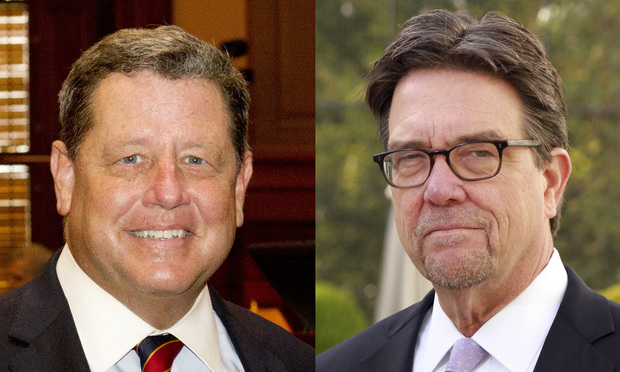Georgia Voters Ask Judge to Postpone Primary to Implement COVID-19 Safety Plan
The plaintiff voters contend Secretary of State Brad Raffensperger's efforts to use absentee ballots has been fraught with problems and delays.
April 30, 2020 at 11:56 AM
6 minute read
 Timothy Batten (left) and Bruce Brown. (Photos: John Disney/ALM)
Timothy Batten (left) and Bruce Brown. (Photos: John Disney/ALM)
An organization dedicated to election integrity and five women voters have asked a federal judge to delay Georgia's primary for three weeks to implement a detailed COVID-19 safety plan.
Plaintiffs lawyers asked District Judge Timothy Batten in a motion filed Thursday in the U.S. District Court for the Northern District of Georgia for an injunction postponing the primary, which also includes nonpartisan elections for the state's judges, until June 30 in order to implement a comprehensive 18-point plan designed by the plaintiffs. The state already twice postponed the primary, which was originally scheduled for March 24.
The pandemic safety plan proposed by the plaintiffs would allow in-person voting with significant safety requirements to prevent the spread of COVID-19 and would correct a number of problems associated with Secretary of State Brad Raffensperger's push for a robust use of absentee ballots. But it would also largely replace statewide use of a new computer voting system that includes both a touchscreen and a paper ballot component exclusively with paper ballots.
U.S. District Judge Timothy Batten has given the secretary of state until May 12 to respond.
Marilyn Marks, executive director of the Coalition for Good Governance, called the Georgia case "the first that we know of that squarely addresses a state's obligation to provide safe elections during a pandemic. There are two huge interests involved — protecting the right to vote and protecting people's health. Both weigh heavily in favor of requiring the state to do much more."
Proposed COVID-19 Voting Safety Plan
- Use paper ballots instead of the state's new touchscreen voting machines.
- Let election superintendents decide the number of voting stations rather than having one for every 250 voters.
- Allow early voting the weekend and Monday before Election Day.
- Set up a curbside voting location with paper ballots and more for counties over 100,000.
- Allow election superintendents to process, but not tabulate, mail-in ballots the Monday before Election Day.
- Don't reject absentee ballots without a postmark received the day after Election Day.
- Don't reject absentee ballots postmarked by Election Day that arrive within three days.
- Allow voters to give oral oaths rather than sign voter certificates and allow them to present disposable paper copies of their photo IDs rather than present the original.
- Provide personal protective equipment for pollworkers and voters.
- Mark off distances at polling places where lines form to help voters remain six feet apart.
- Set up clear plastic barriers between poll worker stations and voters.
Marks said Georgia "has a very narrow window to avoid the inhumane election conditions that risked Wisconsin poll workers' and voters' lives. Georgia's risk factors are far more threatening than Wisconsin's in early April."
The Wisconsin Department of Health Services reported that 36 voters and poll workers tested positive for COVID-19 due to exposure during the April 7 primary, which that state's Supreme Court refused to delay.
"Even if the pandemic voting safety measures were costly, the expense would be worth it," plaintiffs counsel Bruce Brown of Atlanta and Robert McGuire of Seattle argued.
They said most of the requested measures "involve no cost at all."
"Where the state will need to spend money, it must do so only to correct prior, egregious mistakes" stemming from significant problems that have emerged in its efforts to supply the state's voters with absentee ballot applications and ballots, the lawyers said.
Raffensperger said Thursday that groups across the nation are "disingenuously" using the pandemic "to push their failed policies through the court system." The secretary cited steps his office has taken to notify the voting public of an expanded availability of absentee ballots.
His office reported Thursday that more than a million Georgians have requested absentee ballots and 700,000 ballots have been mailed out. "Our goal was to keep voters safe and take the pressure off of our in-person voting locations," he said at a news conference.
But in pressing for an injunction, the voters' lawyers pointed out that 635,000 absentee ballots were sent to the wrong addresses and thousands of ballots were missing a mandatory ballot secrecy sleeve. Nearly 30,000 Chatham County voters were sent the wrong ballot, and the state's two largest counties — Fulton and DeKalb — have already missed statutory deadlines for mailing absentee ballots to voters, according to the motion.
Pushing the primary back to June 30 would give thousands of absentee voters disadvantaged by missed deadlines and other errors more time to apply for, obtain, and mail in their absentee ballots and secrecy envelopes and give counties more time to process them, voters' lawyers argued.
In asking to move the primary and enforce a COVID safety plan, they also claimed Raffensperger has done little to address the dangers of in-person voting on the state's new touch-screen voting machines.
But they said there is already a contingency plan for the use of paper ballots. Last year, U.S. District Judge Amy Totenberg ordered the state to develop the plan after she barred the use of any obsolete voting equipment after Dec. 31. The state's new touchscreen system hasn't been employed in a statewide election.
"Election systems are different from state to state, but the approach to election safety in a pandemic should be the same: every step of in-person voting has to be re-evaluated in light of the pandemic, and absentee voting systems have to be more robust," Brown said. "A lot if it is common sense: use hand-marked paper ballots instead of cumbersome disease-carrying touchscreen machines, dedicate whatever resources are necessary to make absentee balloting work for everyone."
"The right to vote is violated if you have to wager your health just to exercise it," McGuire said. "You shouldn't have to choose between your health and voting, not when it's easy and lawful to move the election to a safer time period and to take basic steps to make voting a lot less risky for voters and poll workers."
NOT FOR REPRINT
© 2025 ALM Global, LLC, All Rights Reserved. Request academic re-use from www.copyright.com. All other uses, submit a request to [email protected]. For more information visit Asset & Logo Licensing.
You Might Like
View All
Transgender Care Fight Targets More Adults as Georgia, Other States Weigh Laws

Georgia Republicans Push to Limit Lawsuits. But Would That Keep Insurance Rates From Rising?
5 minute read
A Plan Is Brewing to Limit Big-Dollar Suits in Georgia—and Lawyers Have Mixed Feelings
10 minute readTrending Stories
Who Got The Work
J. Brugh Lower of Gibbons has entered an appearance for industrial equipment supplier Devco Corporation in a pending trademark infringement lawsuit. The suit, accusing the defendant of selling knock-off Graco products, was filed Dec. 18 in New Jersey District Court by Rivkin Radler on behalf of Graco Inc. and Graco Minnesota. The case, assigned to U.S. District Judge Zahid N. Quraishi, is 3:24-cv-11294, Graco Inc. et al v. Devco Corporation.
Who Got The Work
Rebecca Maller-Stein and Kent A. Yalowitz of Arnold & Porter Kaye Scholer have entered their appearances for Hanaco Venture Capital and its executives, Lior Prosor and David Frankel, in a pending securities lawsuit. The action, filed on Dec. 24 in New York Southern District Court by Zell, Aron & Co. on behalf of Goldeneye Advisors, accuses the defendants of negligently and fraudulently managing the plaintiff's $1 million investment. The case, assigned to U.S. District Judge Vernon S. Broderick, is 1:24-cv-09918, Goldeneye Advisors, LLC v. Hanaco Venture Capital, Ltd. et al.
Who Got The Work
Attorneys from A&O Shearman has stepped in as defense counsel for Toronto-Dominion Bank and other defendants in a pending securities class action. The suit, filed Dec. 11 in New York Southern District Court by Bleichmar Fonti & Auld, accuses the defendants of concealing the bank's 'pervasive' deficiencies in regards to its compliance with the Bank Secrecy Act and the quality of its anti-money laundering controls. The case, assigned to U.S. District Judge Arun Subramanian, is 1:24-cv-09445, Gonzalez v. The Toronto-Dominion Bank et al.
Who Got The Work
Crown Castle International, a Pennsylvania company providing shared communications infrastructure, has turned to Luke D. Wolf of Gordon Rees Scully Mansukhani to fend off a pending breach-of-contract lawsuit. The court action, filed Nov. 25 in Michigan Eastern District Court by Hooper Hathaway PC on behalf of The Town Residences LLC, accuses Crown Castle of failing to transfer approximately $30,000 in utility payments from T-Mobile in breach of a roof-top lease and assignment agreement. The case, assigned to U.S. District Judge Susan K. Declercq, is 2:24-cv-13131, The Town Residences LLC v. T-Mobile US, Inc. et al.
Who Got The Work
Wilfred P. Coronato and Daniel M. Schwartz of McCarter & English have stepped in as defense counsel to Electrolux Home Products Inc. in a pending product liability lawsuit. The court action, filed Nov. 26 in New York Eastern District Court by Poulos Lopiccolo PC and Nagel Rice LLP on behalf of David Stern, alleges that the defendant's refrigerators’ drawers and shelving repeatedly break and fall apart within months after purchase. The case, assigned to U.S. District Judge Joan M. Azrack, is 2:24-cv-08204, Stern v. Electrolux Home Products, Inc.
Featured Firms
Law Offices of Gary Martin Hays & Associates, P.C.
(470) 294-1674
Law Offices of Mark E. Salomone
(857) 444-6468
Smith & Hassler
(713) 739-1250







